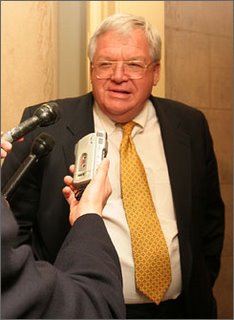Monday, November 06, 2006
Audit Of Capitol Security Upgrade Blocked By Hastert's Office

House Speaker Dennis Hastert's office (it is always his office--never him) blocked a probe of contracting malfeasance in a major Capitol security project.
In early 2004, as House Appropriations Committee investigators prepared to launch a sensitive audit of highly classified Capitol Hill security upgrades, Hastert's chief counsel made a surprise visit to the first meeting of the auditors.
His message was clear, according to participants: The speaker's office was not happy about the probe and would keep investigators on a tight leash. In September 2005, despite growing evidence of sweetheart deals, kickbacks, wasteful contracts and shoddy work, the probe was suddenly shut down. ...
Since the Cold War days of the Kennedy administration, a highly secret organization has watched over the security of what is known as the Capitol campus, which includes the Capitol, the House and Senate office buildings and the Supreme Court. That organization got a renewed mission after the Sept. 11, 2001, terrorist attacks, when hundreds of millions of dollars were channeled to it, mostly through the classified "black" budget of the House and Senate defense appropriations subcommittees.
In 2004, the chairmen and ranking Democrats on the House Appropriations Committee and House defense appropriations subcommittees tasked contract investigators to look at contracting on highly classified security upgrades, especially air filtration systems being installed to protect the campus from chemical and biological attack. The scale of the upgrades is unprecedented, and so is the cost, likely to run more than $100 million, according to three different sources close to the project.
Concern had been raised that contracts were being steered to unqualified bidders, who were wooing the secret organization's management with Redskins tickets, expensive lunches, even golf clubs, said Ronald Garant, one of the investigators. But the more pressing issue was sheer waste and incompetence, he said. Another former appropriations committee investigator familiar with the probe said the team was told by a Lockheed Martin contractor that the filtration system being installed in the Ford House Office Building was so shoddy that the children in the building's day-care center would not stand a chance in the event of a chemical or biological attack.
In early 2004, Garant and other investigators went to Arlington to meet with the organization. To their surprise, Van Der Meid, the speaker's chief counsel, made the trip, too. Van Der Meid made it clear from the start that he did not want the probe going forward, according to Garant, a retired, former high-ranking auditor for the Defense Department's comptroller with more than 30 years of experience in government oversight.
Investigators were prevented from talking to key personnel, had access blocked to key facilities and could not inspect the equipment they were supposed to be assessing. After hitting roadblock after roadblock, Robert H. Pearre, the appropriations committee's chief of investigations, delivered the news last September that the investigation had been shut down and its offices in CIA headquarters in Langley, Va., were to be closed.
"We were told, 'Lock the door, change the combination, take your papers, bring them over here. It's all over,' " Garant said.


